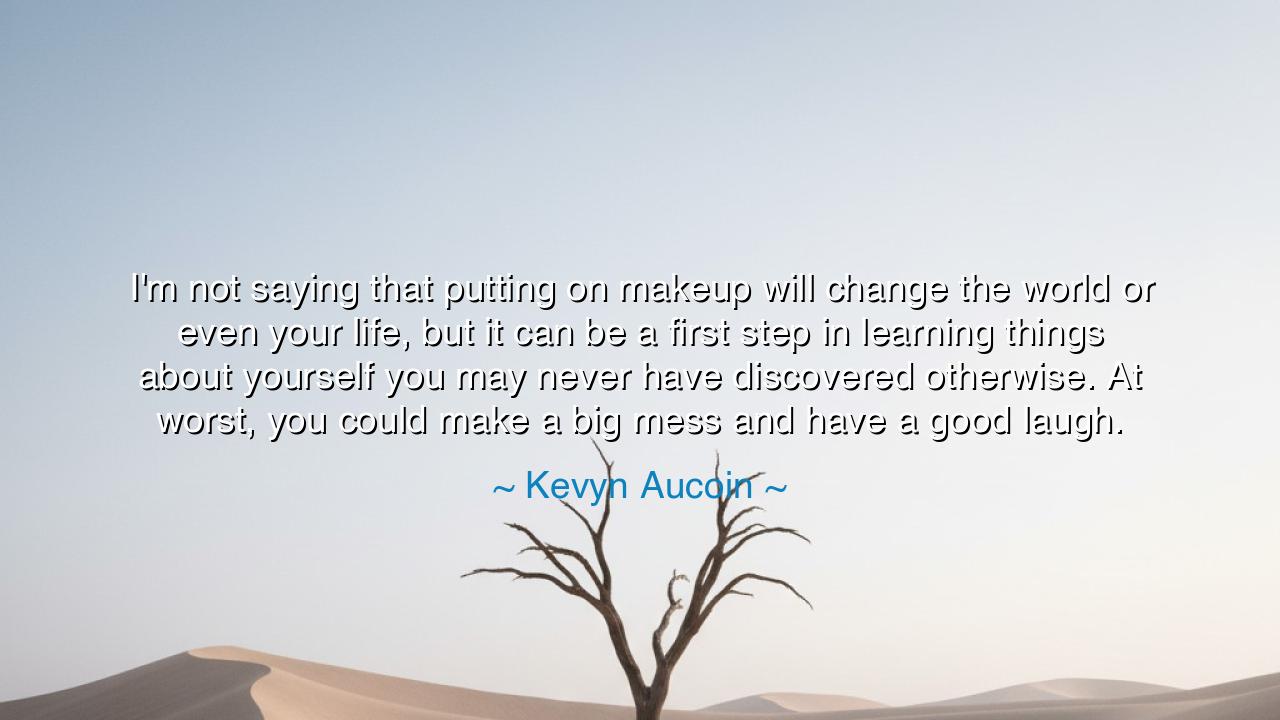
I'm not saying that putting on makeup will change the world or
I'm not saying that putting on makeup will change the world or even your life, but it can be a first step in learning things about yourself you may never have discovered otherwise. At worst, you could make a big mess and have a good laugh.






“I’m not saying that putting on makeup will change the world or even your life, but it can be a first step in learning things about yourself you may never have discovered otherwise. At worst, you could make a big mess and have a good laugh.” – Kevyn Aucoin
In these gentle and profound words, Kevyn Aucoin, the visionary artist of beauty, reveals a truth that transcends cosmetics. Though he speaks of makeup, he is, in truth, speaking of self-discovery, of the courage to explore one’s own identity, and of the power of small, creative acts to awaken the spirit. His tone is humble, yet his message is radiant: that even the simplest act of adornment — the stroke of color upon the face — can become a mirror for the soul. For in learning to shape how we appear to the world, we begin to understand the deeper shapes of who we are within.
The origin of this quote lies in Aucoin’s own journey — a man born in the small town of Lafayette, Louisiana, who rose to become one of the greatest makeup artists of his time. But his art was never shallow. For him, beauty was not about perfection or glamour; it was about authenticity, about discovering the divine within the human. Having faced pain, rejection, and self-doubt throughout his life, Aucoin understood that transformation begins not with changing who we are, but with learning to see ourselves clearly. The brush and the mirror, to him, were not tools of vanity but instruments of introspection.
When he says that makeup will not change the world, he acknowledges the limits of artifice — that no powder or pigment can rewrite destiny or heal the wounds of the human heart. Yet, in the same breath, he offers hope: that the act of creation, however small, can awaken something luminous within us. By experimenting, by daring to create, by embracing the playfulness of imperfection, we may uncover hidden parts of our spirit — the courage to be seen, the joy of expression, the laughter that comes from learning without fear. Beauty, then, is not the mask we wear, but the freedom that emerges when we stop fearing the mirror.
This truth echoes through history, where the act of transformation has always been a path toward knowledge. Consider the ancient actors of Greece, who donned masks not to hide themselves, but to reveal greater truths about humanity. Through artifice, they found authenticity; through performance, they discovered emotion. So too did Kevyn Aucoin teach that the outer act of beautification can reflect an inner journey of discovery. For as the philosopher once said, “Know thyself” — and if that knowledge begins with a brush and a mirror, then even the smallest ritual becomes sacred.
In a world often weighed down by seriousness, Aucoin also gifts us the wisdom of humor. “At worst,” he says, “you could make a big mess and have a good laugh.” These words are a reminder that life’s beauty does not demand perfection. The ancients called this humility the virtue of balance — the understanding that even in failure there is joy, even in mistakes there is meaning. Laughter, too, is a teacher, for it lightens the heart and dissolves the fear that keeps us from trying. To create — whether on a canvas, a face, or within one’s life — is to embrace imperfection as part of the masterpiece.
In the deeper sense, Aucoin’s message is not only about makeup, but about permission — the permission to explore, to play, to learn who you are beyond the expectations of others. Too often, the world teaches us to conform, to hide, to silence the parts of ourselves that shimmer differently. But when we dare to experiment, even with something as small as a stroke of color, we reclaim a piece of freedom. We learn that self-expression is not vanity; it is an act of courage. To love how you present yourself to the world is to begin to love who you are.
So, my children, take this as a teaching: do not fear the mirror, and do not fear the mess. Whether with brushes or words, music or movement, find the art that lets your soul speak. Learn about yourself not through judgment, but through curiosity. Be willing to make mistakes, to laugh at them, to try again. The world may not change with each act of creation, but you will — and that, in turn, changes everything.
For as Kevyn Aucoin reminds us, learning to live is much like learning to paint the face — each day a new chance to discover, to celebrate, and to begin again. And though beauty fades and laughter echoes away, the knowledge you gain of your own heart remains eternal. So color your life boldly, love your imperfections fiercely, and never forget to laugh when the lines go astray — for even in the mess, there is meaning.






AAdministratorAdministrator
Welcome, honored guests. Please leave a comment, we will respond soon